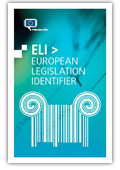

This document is an excerpt from the EUR-Lex website
About ELI
What is ELI?
The European Legislation Identifier (ELI) is a system to make legislation available online in a standardised format, so that it can be accessed, exchanged and reused across borders. This initiative, taken jointly by EU countries and institutions, is enshrined in the Council Conclusions of 6 November 2017 on the European Legislation Identifier (2017/C 441/05). *
ELI is based on a voluntary agreement between the EU countries. It includes technical specifications on:
- web identifiers (URIs) for legal information
- metadata specifying how to describe legal information
- a specific language for exchanging legislation in machine-readable formats
ELI is funded under Action "Facilitating the exchange of legislation data in Europe ", which falls under the Interoperability Solutions for European Public Administrations ( ISA² ) Programme.
* The Council conclusions of 6 November 2017 on the European Legislation Identifier are built on an initial version of the Council Conclusions published on 26 October 2012 (2012/C 325/02).
Discover ELI, the European Legislation Identifier
Video 1 - Introduction to the European Legislation Identifier
Video 2 - The 3 pillars of ELI
Video 3 - Getting started with ELI
Video 4 - ELI and schema data
Video 5 - ELI-DL for Draft Legislation
ELI Governance
ELI is governed by a task force comprising representatives of Austria, Belgium, Denmark, Finland, France, Ireland, Italy, Luxembourg (chair), Norway, Portugal, Serbia, Spain, the United Kingdom and the EU Publications Office.
Governance rules of the European Legislation Identifier Task Force (ELI TF) and processes
to changes to ELI specifications.

ELI leaflet
ELI's advantages
ELI has the following advantages:
-
Better-quality, more reliable legislation data
ELI helps improve the quality and reliability of legal information online through the use of persistent identifiers and structured metadata.
-
Greater interoperability
ELI encourages interoperability among information systems by structuring legislation in a standardised way, while taking account of the specific features of different legal systems.
-
Better access to legislation
Thanks to search engine optimisation, ELI makes it easier to locate legal data, which can thus be more widely used.
-
It promotes the development of new services
Making legislation available in a structured way helps develop value-added services.
-
Cost savings
ELI makes information flows more effective and shortens the time taken to publish legislation.
-
It promotes transparency
By improving access to legal information, ELI makes it easier to follow up work done by governments, and promotes greater accountability.
Last update: 24/09/2024
